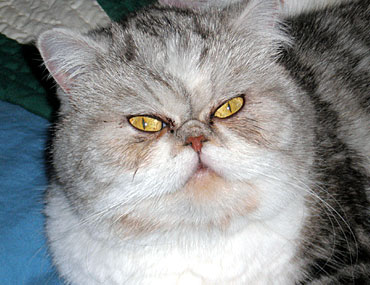Breed Introduction:
The Exotic is a cat breed known for its round face, short muzzle, and stocky build. It was developed as a cross between the Persian and American Shorthair cats, aiming to create a cat with a similar look to the Persian but without the long hair that requires extensive grooming. The Exotic has become popular among those who appreciate the Persian appearance but desire an easier maintenance option.
Lifespan:
The average lifespan of an Exotic is around 12-15 years, which can vary based on health care, diet, and genetics.
Coat Length:
The Exotic has a medium-length coat that does not require daily brushing like some other longhaired breeds. Weekly grooming should be sufficient to keep the fur healthy and tangle-free.
Alias(es):
Exotics are also commonly referred to as “Exotic Shorthairs” due to their origins from breeding shorthaired Persians.
Height:
These cats typically weigh between 8 and 16 pounds, with males often being larger than females. They have a solid, muscular frame.
Place of Origin:
The Exotic originated in North America during the mid-20th century when breeders sought to create a low-maintenance alternative to the Persian.
Body Size:
Exotics have a large, cobby body with broad cheeks and a heavy chest. Their legs are strong and well-muscled.
Shedding Level:
They shed moderately year-round and may experience a heavier period once or twice a year depending on seasonal changes. Regular grooming helps reduce loose hairs inside your home.
Trainability:
Exotics are intelligent cats but can sometimes be independent. Positive reinforcement training methods work best, and they usually learn quickly once they understand what is expected of them.
Additional Characteristics/Notes:
Exotics are generally calm and affectionate cats. They enjoy cuddling up with their humans and observing household activities from quiet perches. They do not typically enjoy high levels of activity or playtime compared to more energetic breeds. However, they still need mental stimulation through interactive toys and social interaction with their human family members.
